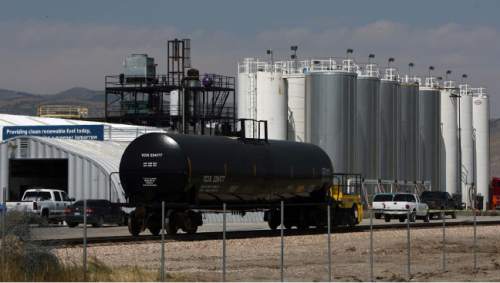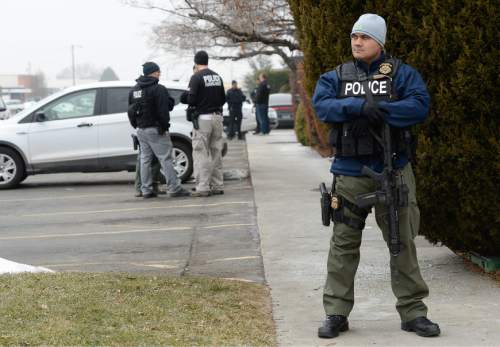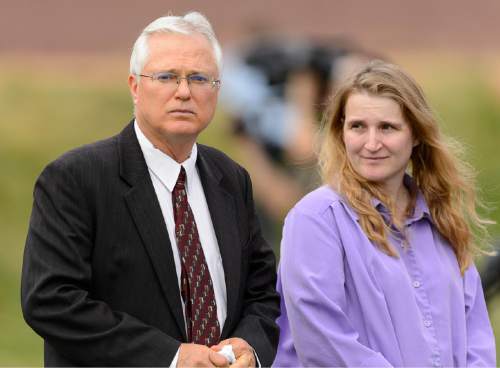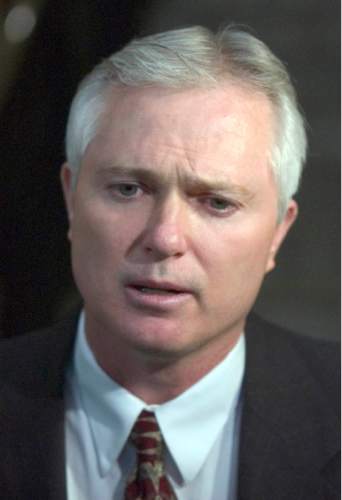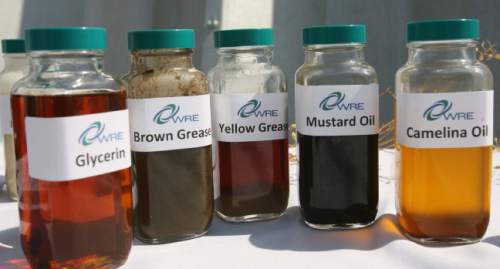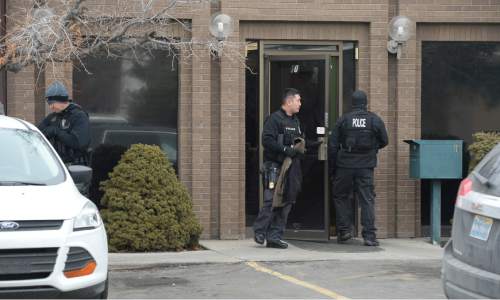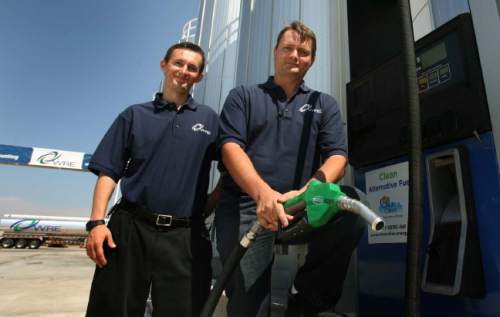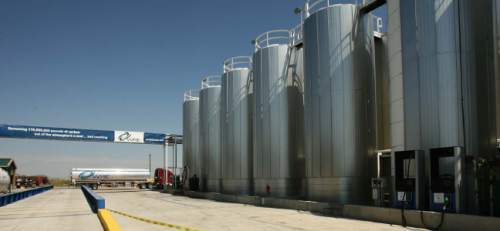This is an archived article that was published on sltrib.com in 2016, and information in the article may be outdated. It is provided only for personal research purposes and may not be reprinted.
The storage tanks Washakie Renewable Energy was planning to build while Amanda Brown worked there weren't for biofuel Washakie actually made, she says. They were for the biofuel Washakie planned to buy.
Buying biofuel wouldn't allow Washakie to qualify for all the government benefits of making its own, but the company had a solution for that, Brown says.
Washakie brought children to the office near 3900 South and 700 East in South Salt Lake to help forge documents to make it appear as though the company was in compliance, Brown said. The documents, including bills of lading and laboratory reports, would go into the files in anticipation of IRS audits.
"They would have their 9- and 10-year-old kids come in and make the forms," Brown told The Salt Lake Tribune.
Washakie has connections to the Kingston group — the polygamous sect known for its fundamentalist Mormon beliefs and history of child abuse and forced marriages. Those connections were on display Wednesday when agents from the IRS and the Environmental Protection Agency served search warrants at Salt Lake County offices used by Washakie and other businesses affiliated with the Kingstons, also known as the Davis County Cooperative Society or the Latter Day Church of Christ.
F. Mark Hansen, a lawyer for the cooperative, said Wednesday the federal agents were seeking accounting records and that his clients were cooperating. Agents also searched the home of Washakie executive Jacob Kingston. No arrests were made.
The EPA in 2011 accused Washakie of reaping the rewards of federal programs meant to lessen U.S. reliance on fossil fuels, without actually producing the renewable biofuels — made from grease, animal fat and other oil wastes — it claimed to have manufactured.
Meanwhile, Washakie, also known as WRE Group, has become one of Utah's highest-profile companies — a frequent advertiser at Utah Jazz games, on local TV stations and at Megaplex Theatres.
Washakie and its executives have also given about $190,000 to politicians and political committees.
Family fuel • Jacob and Isaiah Kingston are sons of John Daniel Kingston, who was jailed for beating his daughter into unconsciousness in 1998 after the girl, then 16, ran away from an arranged marriage to her uncle. John Daniel, who according to court testimony once had 14 wives, was on hand in 2011, when his sons held an open house at the Washakie production plant in Plymouth near Interstate 15 and the Idaho line.
"The media has inaccurately portrayed my family," John Daniel Kingston told a Tribune reporter at the open house. "We are all about sustainability, self-sufficiency and contributing to the community."
U of U CoE faculty with Jacob Kingston, CEO of WRE and Steve Miller, Pres. of Miller Sports Properties @UtahCoE pic.twitter.com/k74rcpLGTx
— WRE Group (@WREGroup) April 9, 2014
Washakie had help from U.S. Department of Agriculture programs designed to produce alternative fuels, which gave the company $569,592 in grants between 2011 and 2014, federal records show.
Biofuels can be manufactured from sources such as cooking oil and soybeans and mixed with conventional fuels to power cars, trucks or anything else with a combustion engine. Under a program created by Congress and administered by the EPA, fossil-fuel companies are required to buy a certain amount of biofuels or credits for biofuels from biofuel manufacturers.
Those manufacturers lessen their federal tax burden by $1 for every gallon they produce.
But Washakie appears to have been more engaged in the business of buying biofuel. A search of state and federal court records shows multiple lawsuits between Washakie and companies from which it sought to buy biofuel.
One company filed suit against WRE Group in 2014, alleging it did not follow through on a $90 million obligation to purchase fuels imported from Argentina.
Washakie executives "are either insolvent or operate their business without any regard for contractual obligations or rule of law," lawyers for importer LifeTree Trading PTE wrote in a suit filed in November 2014 in federal court in New York.
Washakie had earlier that year contracted with LifeTree to buy 90,000 metric tons of a biofuel known as soy methyl ester. But when the product arrived, Washakie declined to accept delivery, imposing huge losses on LifeTree, according to the suit.
"Almost immediately after it signed the contract, WRE began delaying its payment obligations and strung LifeTree along for over six months with false promises of performance," attorney Joshua Abraham wrote in court filings.
Big spenders • A month after LifeTree sued WRE Group, Washakie threw its holiday party at one of Utah's marquee venues — the Salt Palace.
One of the speakers at the Dec. 19 event was Utah Attorney General Sean Reyes, a campaign spokesman confirmed last week. A Tribune review of campaign-finance disclosures found that in 2014 and 2015, Washakie and its executives gave $96,235 to candidates and committees for state offices.
And from 2012 through 2015, the newspaper found, the company and those executives donated another $93,500 to federal candidates and committees.
No one has benefited like Reyes. He has received $40,985 in campaign contributions from Washakie and another $10,000 from Jacob Kingston's wife Sally, campaign disclosures show.
Alan Crooks, a spokesman for Reyes' election campaign, said Reyes and one of Washakie's attorneys, Kurt Hawes, are old friends, and Reyes spoke to Washakie at Hawes' request.
Crooks pointed out that Washakie has given money to politicians across Utah and said the company never received any preferential treatment.
"They employ hundreds of people across Utah," Crooks said, "and bring the biofuel industry to Utah."
Crooks said he and Reyes did not know anything about Washakie's business practices.
Hawes, in an interview Thursday, said he and Reyes have known each other for years, but that he did not arrange for Reyes to speak at the Christmas party and didn't know how Reyes came to speak there.
Hawes, who is not a member of the Kingstons' faith, said he left Washakie a few months ago to pursue other career opportunities. But he still had an obligation to Washakie as a client, he said, and declined to answer specific questions about its business practices.
"As a general matter, the industry was somewhat new," Hawes said. "People were getting used to how it works. Just as in any business venture, people think they can do things, and sometimes it works out. Sometimes it doesn't."
Efficient growth • In 2014, Washakie purported in its advertising and testimony to the Utah Legislature to be producing 20 million gallons a year and investing millions in a 40,000-square-foot crushing plant and 123-foot-tall silo for processing oilseed from locally grown soybean and canola.
Washakie was able to secure favorable tax arrangements from Box Elder County in connection with this project. In December 2014, the county commission agreed to establish a 1,000-acre economic development area on the Plymouth project. Any property tax increment from this investment is to be used to upgrade roads serving the plant, according to Mitch Zundel, Box Elder's economic development director.
He did not know whether the crushing plant was completed, but he emphasized that no county money has been diverted to the Washakie development area.
Three months after the economic development zone was approved, the EPA and the U.S. Department of Justice announced Washakie had agreed to pay $3 million in fines to resolve a 2011 complaint issued by the EPA.
An EPA inspection had revealed that Washakie's Utah facility had "failed to produce any biodiesel" eligible for federal credits between January and October 2010, but collected $2 million based on claims that it produced millions of gallons, according to a stipulated settlement.
Washakie then reported to the EPA that the fuel had actually been produced in Texas and New Jersey, but EPA investigators found that no applicable biodiesel had been manufactured at those facilities, either, and Washakie "was not able to provide production records to support" its claim.
The company released a statement saying its violation was a result of a "misinterpretation" of federal law regulating renewable fuels and that the firm "has an excellent compliance record and is committed to its vision of renewable fuel's continued growth and continued commitment to compliance, national independence from foreign oil, and greenhouse gas reduction."
Washakie was cited with eight violations related to record keeping and reporting in addition to the EPA's main allegation of improperly claimed credits.
Brown says she worked in the South Salt Lake offices of Washakie in 2012 and 2013. The same day she learned about a $2.2 million tax credit Washakie planned to claim, she got a job offer from another company. She took it.
"I wasn't comfortable with all of the frauds that were going on," she says.
A lawyer for Washakie did not return a call seeking comment Friday.
After Brown, who's not a member of the Kingston group, saw news of Wednesday's raid, she called the IRS and the U.S. Department of Justice to tell them her experience with the company.
She left voicemails, she says, but no one has called her back.
Utah lawmakers were scheduled last week to hear an appropriations request from Sen. Peter Knudson on behalf of Washakie for $100,000 to study how to efficiently grow soybeans in Utah. The day after the Washakie raids, Knudson withdrew the request.
"We're going to pull this one at this time," said the Republican from Brigham City, about a half-hour from Washakie's plant in Plymouth. "We're still working on some details."
ncarlisle@sltrib.com, bmaffly@sltrib.com
Twitter: @natecarlisle, @brianmaffly
Brian Maffly covers public lands for The Salt Lake Tribune. Maffly can be reached at 801-257-8713.


